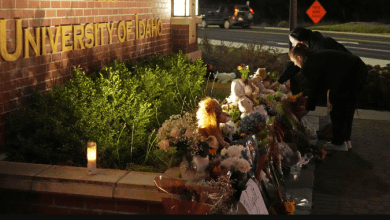
World leaders gathered all week to talk about global issues. Putin appears to have left his seat at the table.
One thing is abundantly evident after the three significant meetings of global leaders that have recently taken place throughout Asia: Vladimir Putin is no longer a big player on the international scene.
Putin, whose invasion of Ukraine over the last nine months has wreaked havoc on the European nation and rocked the global economy, chose not to participate in any of the diplomatic events and instead found himself facing harsh criticism as the world’s opposition to his war seemed to grow.
Earlier this week, the Group of 20 (G20) leaders met in Bali and issued a statement that noted differences in opinions and referred to national positions voiced in other fora, such as a UN resolution condemning Russian aggression against Ukraine “in the harshest terms.”
Leaders of the 21 nations that make up Asia-Pacific Economic Cooperation (APEC) are prepared to perhaps issue a similar statement when the summit draws to an end on Saturday in Bangkok.
After months of discussions and meetings, those economies’ foreign ministers finally came to an agreement on Friday on their own joint statement, which echoed verbatim the language presented in Bali earlier this week. This opens the door for APEC leaders to follow suit when their meeting concludes on Saturday.
The letter said that there were many “assessments” held inside the group, adding that “most members strongly denounced the conflict in Ukraine and highlighted it is inflicting great human misery and increasing existing fragilities in the world economy.”
Leaving aside the discussions at the summits, the last week has shown Putin as being more and more isolated. The Russian president is holed up in Moscow and refuses to even interact with other world leaders when they convene in large gatherings.
According to Alexander Gabuev, a senior fellow at the Carnegie Endowment for International Peace, Putin’s assessment was probably influenced by his fear of potential political maneuvers against him should he leave the capital, his obsession with personal security, and his desire to avoid confrontational scenes at summits.
He could also not want to draw unfavorable attention to the few countries that have continued to support Russia, including China and India, whose leaders Putin met with at a summit in Uzbekistan in September.
According to Gabuev, “He doesn’t want to be this poisonous man.”
view hardening
However, there are indications of lost tolerance even among nations which have not taken a harsh position against Russia—if not against Russia itself, then certainly against the ripple consequences of its aggressiveness. Energy shortages, food security concerns, and soaring global inflation are now straining economies all around the globe.
Although Indonesia, which hosted the G20, did not expressly denounce Russia for the invasion on Tuesday, its President Joko Widodo said, “We must halt the conflict.”
India also urged G20 leaders earlier this week to “find a way to return to the road of truce,” since it has been a major consumer of Russian energy even as the West has shied away in recent months. The phrase “Today’s period must not one of war” appears in the conference’s closing statement, echoing what Modi told Putin when they spoke in September outside of a meeting on regional security in Uzbekistan.
It’s less certain if China, whose strategic alliance with Russia is strengthened by the good chemistry between leader Xi Jinping and Putin, has changed its position. Beijing has resisted calling the invasion an invasion for a very long time. Instead, Moscow has criticized Western sanctions and emphasized Kremlin talking points that NATO and the US are to blame for the crisis, but in recent months, this language has seemed to be toned down on its state-controlled domestic media.
Later, in a meeting with US President Joe Biden, Xi restated China’s view that “nuclear weapons cannot be utilized and a nuclear war cannot be waged,” according to Chinese Foreign Minister Wang Yi, who spoke to state media in Beijing.
However, experts on Chinese foreign policy suggest that China’s intention to retain its close relations with Russia is likely still intact.
Although these comments indirectly criticize Vladimir Putin, Brian Hart, a fellow with the China Power Project at the Center for Strategic and International Studies in Washington, said he didn’t believe they were meant to distance China from Russia. “Xi is speaking to a listenership that wants to hear these things.”
Split-screen
Xi’s diplomatic visit to Bali and Bangkok this week, though, makes Russia’s isolation seem even more glaring.
While Xi was viewed as a valued global partner by Western leaders, several of whom visited with the Chinese leader for discussions aimed at improving communication and collaboration, the Biden administration saw Beijing — not Moscow — as the “most severe long-term risk” to the international order.
French President Emmanuel Macron sought to make a difference between Russia’s actions and the tensions with China in his passionate plea for peace given to a gathering of business executives taking place alongside the APEC conference in Bangkok on Friday.
Macron said: “What makes this war different is that it is an attack against international laws. He was alluding to US-China rivalry and escalating conflict in Asia’s regional waterways. All nations… benefit from stability because of international laws,” it said, before urging Russia to return “to the table” and “respect international law.”
After a Russian-made missile struck Poland on Wednesday, the last day of the G20 meeting, killing two people, the urgency of that emotion increased. A danger to Polish security as a NATO member might result in a reaction from the whole union.
Initial inquiry indicated the missile may have accidentally come from the Ukrainian side during missile defense, which helped alleviate the crisis. However, it also underscored how easily a mistake might trigger a global conflict.
The next day, US Secretary of State Antony Blinken referred to a “split-screen,” as he put it.
As the world tries to assist the most disadvantaged, Russia attacks them; as leaders across the globe reaffirmed our commitment to the UN Charter and international laws that benefit all of our people, we are seeing a very revealing split screen. These same ideals are still being attempted to be undermined by President Putin, Blinken told reporters in Bangkok on Thursday night.
Consensus?
The US and its allies were prepared to convey that message to their international counterparts going into the week of the international gathering. Strong statements have been made, but it has been difficult to get agreement on that point of view; disagreements still exist.
While the majority of members “strongly condemned” the war, there were “other views and different assessments of the situation and sanctions,” according to the G20 declaration and the ministerial-level statement from APEC, both of which acknowledge the differences in how members of the UN voted to support its resolution “deploring” Russian aggression.
According to representatives from both summits, it was difficult to even make such a statement with qualifications. According to Indonesia’s Jokowi, G20 leaders discussed the paragraph on Ukraine up until “midnight.”
The geostrategic and economic ties that the countries in the groupings have with Russia influence how they operate. According to the former Thai foreign minister Kantathi Suphamongkhon, another worry some Asian countries may have is if sanctions on Russia are a part of a US effort to undermine Moscow.
The RAND Corporation Center for Asia Pacific Policy advisory board member Suphamongkhon said, “Countries are saying we don’t want to merely be a pawn in this game to be used to undermine another power” (CAPP). Instead, he argued, framing criticism of Russia in terms of its “violation of international law and possible war crimes” would focus on issues that “everyone here condemns.”
Rejecting Russia in that way may also send a message to China, which has pledged to use force if necessary to “reunify” with Taiwan’s self-governing democracy and has flouted UN rulings rejecting its territorial claims in the South China Sea.
Efforts this week may have increased pressure on Putin, but the Russian president is accustomed to such dynamics: the Group of Seven (G7) bloc was the Group of Eight before Putin was expelled over his annexation of Crimea in 2014; it is unclear whether the impact of the international expressions will be felt.
Leaders emphasized this week that suffering will continue without Putin, and that the international system would suffer as a result.





Amazing
Great
Great
Awesome
Interesting
Great
Ok
Good
Good
Nice
Nice
Very interesting
Very interesting
Of course
Nice
Interesting
Great and amazing
Wow
Good
Interesting
Alright
Alright
Never
Hahaha
Wow
Wow
Even
Good
Good
Nice
Putin is nice
Good
The man the putin
Okay
sar
Fine
Ciol
Okay
Yea
Yea
Yes it is
Great
Boom
Wonderful
Yh
Yea
That’s great
You think so
Good
Nice awesome
Hi
Nice
Why is thus happening
Abi oh
Great
Good
Good
Yes o
Nice one
Great
Nice
Okay
Ok
Wow
I love this
World
Human being
Hey
I love 💕 this
People
Wow
Good 👍
Wow
Alright…
Hilarious
Good
I like that
Alright
Good
Ok oo
World leaders
Wow
Great
Great
Good
That’s cool
Good
Good
Cool
The world leaders should try their best to settle the rancour.
Great
Hmm okk
Good
Great news
Good
Intresting
Good
Hmm
Good
Okay
Putin putin
Desire
Very Amazing
Wow
Hmmm
Toor
Interesting
Very stoborn president
He is a president with swag
Hw
Putin that man😔
Good
Really
Wow
Nice
Okay
Leaders
Good
That’s great
Ok
Ok
This is also a fact ,global issues is taking control rampantly now
Hmmm
Good
Cool
Interesting
Hmm
Good
Great
Good
This Putin sef
Alright
Good news
Great
Oh cool
Nice
Ok. Great Move
Great
Alright
Putin 😫😁
Alright
Good evening
Goodluck
Good
Nice one 1
Good evening
Hello
Ok
Good Move
Good news
Good news
Nice one
Put Putin
Awesome
OMG
Wow, awesome
Good news
Good
Good update
Sweet
Good
Nice
Hilarious
Not bad at all
Alright
Ok
Good
Agent of devil
Chai
Cool
Okay
Good
Of course
Good
Ok
Great
Hmmmm Putin things
Ok
Good to hear
Ok
They should take stronger measures
They should take stronger measures
Yea
Wow
Good
Nice
Hmmm
Hmmmm
Amazing Steps
Amazing
Good
Waw
Good
Nice
Amazing
Great
Alright
Yeah
Good
Interesting
Wahala no dey finish
Why
Ok
Ok
Wow
Touching
Commendable
Satisfactory
Melancholy
Plausible
Perfect developer
Perfect
Mad
World leaders
Cool
Why did Putin do such
Gracious
okay
November 22 @8:18
Good
We are for peace not war
We are for peace
Good
Good
Nice
Ok
Such a great move
Really
Elder god
Nice one huh
Hmmm
That prensident sha
Hmmm ok
Na wah oo
Help is needed
Incredible
Nice
Great
Woo
Putin the man of the moment
Wow
Hmmm
Okay
Wow😲😲🤩
This is awesome👍👍👏
Nice
Okay
Welcome development
Good
Good
Good
Good
World peace
Good
👌
Bshdbdjdnsj
Okay
Nice
Cool
Nice
Good one
Okay..nice
Russian President
What
Okay
Nice one
Okay
I love that
Great
Embarrassing
Painful
Good
Cool
Aso
Wow great
Really
Okay
Putin is very wise
Ok
Ohh Putin
Better
Ok
Nice
Okay 👍
Okay
Very good
Okay
Good
Hey
Hi
G20 leaders
UN resolution condemning Russian aggression against Ukraine, supported
Okay
Good
Good
Wow
Cool